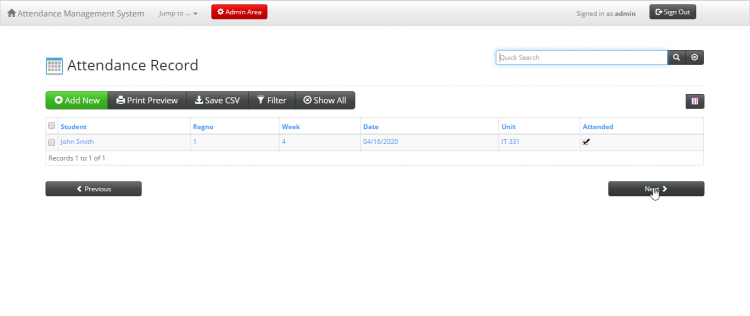The Attendance Management System with Source Code is a PHP project that can maintain daily attendance records easily and conveniently. This system was created using PHP, HTML, MYSQLi, and Javascript.
This application is easy to use, the user has access to all data that is related to student information. You can view the details and add some new information for courses, units, etc. The system data/lists can be printed and exported to CSV, Excel, and PDF. The administrator can manipulate the information and also maintain the security of the system. Database backups can also be generated through admin permission.
Features
- Manage Courses
- Manage Units
- Manage Student
- Manage Attendance
- Manage Website Settings
- Manage User Accounts
- Manage User Groups
How to Run
Requirements
- Download and Install any local web server such as XAMPP/WAMP.
- Download and Extract the source code zip file.
Installation
- Open the XAMPP/WAMP's Control Panel and start "Apache" and "MySQL".
- If you are using XAMPP, copy the extracted folder and paste it into the XAMPP's "htdocs" directory. If you are using WAMP, paste it into the "www" directory.
- Locate the SQL file in the extracted source code folder. The SQL file is known as "attendance_management.sql" and located inside the "db" folder.
- Open a web browser and browse the PHPMyAdmin. (http://localhost/phpmyadmin)
- Create a new database naming "attendance_management".
- Import the SQL file to your newly created database.
- Open a web browser and browse the web application. (http://localhost/Attendance%20Management%20System/)
Admin Access
Username: admin
Password: admin
Demo
That's it! I hope that this system can help you with what you are looking for. For more updates and tutorials just kindly visit this site.
Enjoy Coding!!
Note: Due to the size or complexity of this submission, the author has submitted it as a .zip file to shorten your download time. After downloading it, you will need a program like Winzip to decompress it.
Virus note: All files are scanned once-a-day by SourceCodester.com for viruses, but new viruses come out every day, so no prevention program can catch 100% of them.
FOR YOUR OWN SAFETY, PLEASE:
1. Re-scan downloaded files using your personal virus checker before using it.
2. NEVER, EVER run compiled files (.exe's, .ocx's, .dll's etc.)--only run source code.

